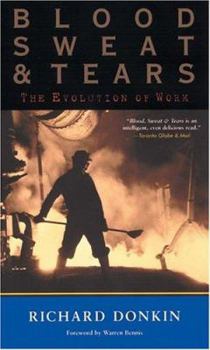Blood, Sweat & Tears (Cloth): The Evolution of Work
Select Format
Select Condition 
Book Overview
Work - a process as familiar to almost everyone as their daily routines - has changed radically in nature over the centuries. Most of these changes have involved revolutionary steps, influencing... This description may be from another edition of this product.
Format:Hardcover
Language:English
ISBN:1587990768
ISBN13:9781587990762
Release Date:May 2001
Publisher:Texere Publishing
Length:374 Pages
Weight:1.65 lbs.
Dimensions:1.3" x 6.3" x 9.3"
Related Subjects
Americas Business Business & Investing Economic History Economics England Europe Guides History Job Hunting & Careers Labor & Industrial Relations Management & Leadership Political Science Politics & Government Politics & Social Sciences Popular Economics Public Affairs & Administration Public Affairs & Policy Schools & TeachingCustomer Reviews
3 ratings
The Mystery of Work
Published by Thriftbooks.com User , 22 years ago
I've seen it; you have too: people working under terrible bosses for low pay in abysmal conditions but loving their jobs. I've seen hundreds of engineers in a huge open office with row after row of desks, and they can't wait to get to work in the morning. I've seen men and women working for Theory X managers they hated. But nevertheless they worked hard with superb art and skill producing great and elegant products. Why? I never found a satisfactory answer.This is the riddle Richard Donkin addresses in this remarkable book: Why do we work and why do we work so hard. Donkin is a columnist writing about work and associated subjects for the Financial Times since the mid-1990s. He came to see work as a complex economic, political, cultural, social, psychological, sociological, organizational and belief phenomenon, the qualifying hallmarks of civilization that separate man from the other animals. Now he has assembled his insights and research into a book, which unlike thousands of one-dimensional management books, has value precisely because it treats work as a complex tapestry interwoven with our lives. Donkin's story of work starts in the Stone Age when two central aspects of work emerged: organization and earning. Fossil records show that men organized themselves for hunting hundreds of thousands of years ago. The evidence is also clear that there were workers who made stone tools beyond their own needs. Many such artifacts are found far from their mother lode, apparently carried by traders. Before they could write, people made products to sell and created the first wealth. The earliest historic records and the observation of contemporary primitive cultures suggest that slavery was not far behind early social organizations. Slavery was one of the first experiments in the economic relationship between manager and managed, and one that was the economic engine of empires for thousands of years. Once history leaves pervasive slavery and serfdom behind and employment emerges, the manager-managed relationship really gets interesting. Donkin gives us a guided tour of great thoughts on the social, cultural, economic, organizational and yes, religious aspects of the relationship between boss and worker. We watch Abraham Darby create cheap effective iron products from his iron smelter at Ironbridge and evolve the idea of permanent jobs. The clock rather then the steam engine is the key machine of the industrial age. We see how the Puritan ideas of John Calvin exerted immense influence on the modern American psyche. Donkin dissects Robert Owen's Utopian enterprises at New Lanark in Scotland and New Harmony in Indiana. Donkin shows us how a century ago George Pullman's vision of mutually beneficial cooperation between capital and labor ended in a tragedy of bitter strikes that left labor and capital in suspicious and adversarial relationships that still bedevil us.I especially enjoyed Donkin's look at industrial efficiency. Fredrick Taylor gave us the idea
Highly Recommended!
Published by Thriftbooks.com User , 23 years ago
If you've ever wondered about how your workplace came to be as it is, or where the work ethic comes from, you'll love Richard Donkin's absorbing exploration of the history of work. From the caveman to the man in pinstripes, he covers it all in a journey that also includes plenty of wit and wisdom. Delving deeply into societies of every era, the book's strength lies in its context and insight. Donkin even provides a good "a-ha!" or two in each chapter, you know, those moments when you smile, nod and say, "Oh, so that's where that comes from." We [...] highly recommend this book to all workers, from hunter-gatherers to CEOs.
Getting to the heart of the matter
Published by Thriftbooks.com User , 23 years ago
Neither a text book nor another stab at management theory, Richard Donkin's thought-provoking book asks 'Why do we work?' and places its emphasis on human nature, innovation and ideas. It is more readable than any other book I have come across on the same topic and provides a rich illustration of the changing nature of work throughout history. The concluding chapters leave you with a sense of enthusiasm and positivity about your role in the workplace, and your ability to pursue those pipedreams you might have given up on.





